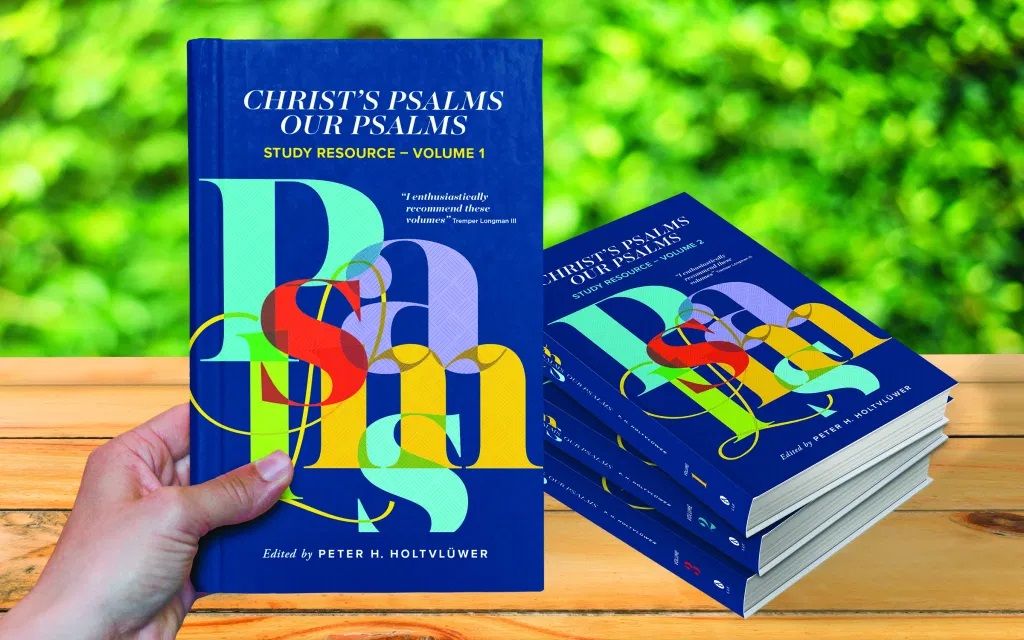An Essential Resource on the Psalms


Christ’s Psalms, Our Psalms: Study Resource (4 vols.), ed. Peter H. Holtvluwer. Carman: Reformed Perspective Press, 2020.
Before, during and shortly after the Reformation, the book of Psalms had primacy in Christian private devotion and public worship. However, in the 18th century this began changing in many corners. Isaac Watts was one of the key drivers behind the change. Known as a pioneer of English hymnody, Watts was convinced that the Old Testament Psalter had to be Christianized. This he did, publishing a metrical “Psalter” in 1719.
Others in history have gone further, arguing that the Psalter, or at least parts of it, are inappropriate for Christians to sing today. One of the most famous is C.S. Lewis and his attitude towards the imprecatory (or cursing) psalms. Sadly, Lewis condemned these psalms (like Psalm 137) as unchristian, even stating that they were “devilish.”
Because they’re Old Testament compositions, the Psalms are often under pressure. This is true even in Reformed churches. The pressure often arises because contemporary readers don’t have a good handle on how to interpret and apply the Psalms in view of the New Testament.
There are plenty of commentaries on the Psalms. Many of them offer helpful insights into the meaning of the Psalms in their original Old Testament context. But few will take you deeper into understanding these songs in the context of the whole Bible. That’s the beauty of this new resource with contributions by 16 Reformed pastors.
Each of the 150 Psalms is treated with the same template:
- Author and Purpose
- Setting
- Type and Structure
- Poetic Elements
- Placement within the Psalter
- Key Words
- Unusual Words or Expressions
- Main Message
- Christ Connection
- Old Testament Links
- New Testament Links
- Confessional References
- Scriptural Themes
- Application
- Occasions for Use
- Questions for Further Study
As I looked at this template, it struck me that this is structurally rather similar to the way I was taught to write exegesis papers in seminary. It definitely exhausts just about everything one could say about the passage under consideration! One of the advantages to taking this approach is that readers can easily find whatever information they may be after with any given psalm. This fits the intention to provide a reference resource — it isn’t a commentary or devotional book that one is going to read from front to back.
The editor, Peter Holtvluwer, has provided an extensive introduction to the Psalter and to the whole work. This introduction covers the Psalms in general terms, explaining the different types and how they point to Christ. There’s also a helpful excursus on the imprecatory psalms, those cursing psalms that upset C.S. Lewis so much.
In preparing this review, I didn’t read through all four volumes from cover to cover. Instead, I chose to read through the treatment of selected Psalms, ones which I’ve preached on. What I found was faithful and clear exposition of God’s Word. I especially appreciated the effort made by all the authors to demonstrate how the Psalms truly are Christ’s songs. Students of God’s Word are sometimes going to disagree on particular details and I don’t agree with every exegetical detail in Christ’s Psalms, Our Psalms either. Yet these are all men who regard the Psalms as God’s infallible Word and are seeking to understand it in the context of everything God has revealed. When we take that approach, then there’s room for what’s called the “freedom of exegesis.”
Who ought to have this on their shelf? Christ’s Psalms, Our Psalms will be useful for pastors looking for a commentary, but it should also be accessible to others, including Bible teachers in Christian schools. Any Hebrew words referenced are transliterated and explained fully. Technical terms for the poetry are often used, but there is a glossary provided.
In 2018, a devotional with the same title was published, by the same authors and editor (see here for my review). It has received wide acclaim as a solid source of Psalms-based encouragement. Good devotionals, just like good sermons, are based on a lot of behind-the-scenes “kitchen work.” With this new study resource, we have access to all that work. It allows the curious Bible student to dig deeper and see more of the beauty of God’s revelation. And perhaps it will be another means by which God’s covenant songbook will still hold a place of primacy in the lives of Reformed believers and their churches. I’ll certainly be referring to it often in the years to come.


